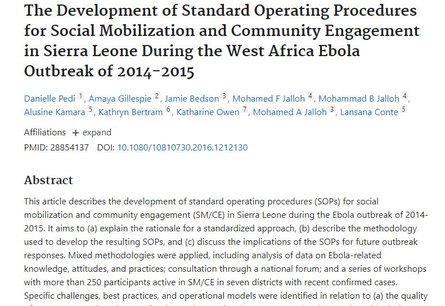
This article describes the development of standard operating procedures (SOPs) for social mobilization and community engagement (SM/CE) in Sierra Leone during the Ebola outbreak of 2014-2015. It aims to (a) explain the rationale for a standardized approach, (b) describe the methodology used to develop the resulting SOPs, and (c) discuss the implications of the SOPs for future outbreak responses. Mixed methodologies were applied, including analysis of data on Ebola-related knowledge, attitudes, and practices; consultation through a national forum; and a series of workshops with more than 250 participants active in SM/CE in seven districts with recent confirmed cases. Specific challenges, best practices, and operational models were identified in relation to (a) the quality of SM/CE approaches; (b) coordination and operational structures; and (c) integration with Ebola services, including case management, burials, quarantine, and surveillance. This information was synthesized and codified into the SOPs, which include principles, roles, and actions for partners engaging in SM/CE as part of the Ebola response. This experience points to the need for a set of global principles and standards for meaningful SM/CE that can be rapidly adapted as a high-priority response component at the outset of future health and humanitarian crises.